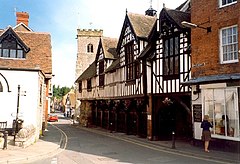Wenlock, Shropshire
| Much Wenlock | |
|---|---|
 The Guildhall |
|
| Much Wenlock shown within Shropshire | |
| Population | 2,877 (2011) |
| OS grid reference | SO623997 |
| Unitary authority | |
| Ceremonial county | |
| Region | |
| Country | England |
| Sovereign state | United Kingdom |
| Post town | MUCH WENLOCK |
| Postcode district | TF13 |
| Dialling code | 01952 |
| Police | West Mercia |
| Fire | Shropshire |
| Ambulance | West Midlands |
| EU Parliament | West Midlands |
| UK Parliament | |
Much Wenlock is a small and picturesque town and parish in Shropshire, England, situated on the A458 road between Shrewsbury and Bridgnorth. Nearby, to the northeast, is the Ironbridge Gorge, and the new town of Telford.
Much Wenlock was historically the chief town of the ancient borough of Wenlock. The "Much" was added to the name to distinguish it from the nearby Little Wenlock, and signifies that it is the larger of the two settlements. Notable historic attractions in the town are Wenlock Priory and the Guildhall. The name Wenlock probably comes from the Celtic name Wininicas, meaning "white area" (in reference to the limestone of Wenlock Edge), plus the Old English loca, meaning "enclosed place". The town was recorded in the Domesday Book as Wenloch. The population of the town's parish, according to the 2001 census, was 2,605, increasing to 2,877 at the 2011 Census.
The Wenlock Olympian Games established by Dr William Penny Brookes in 1850 are centred in the town. Dr Brookes is credited as a founding father of the modern Olympic Games, and one of the Olympic mascots for London 2012 was named Wenlock after the town.
Richard Fletcher mentions Much Wenlock as one of the possible locations where a Sub-Roman British Christian community may have survived the Anglo-Saxon occupation and eventually integrated with the conquerors and influenced their culture.
The town of Wenlock is known to have grown up around an abbey or monastery founded around 680 by Merewalh, a son of King Penda of Mercia, with the small town within its parish boundaries. King Penda installed his daughter Milburga as abbess in 687. Milburga of Wenlock was credited with many miraculous works. The abbey flourished until around 874 when it is thought that a Danish Viking attack occurred.
...
Wikipedia

